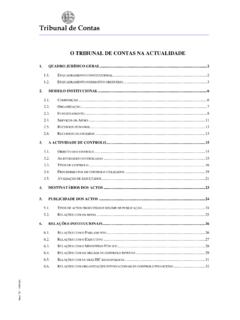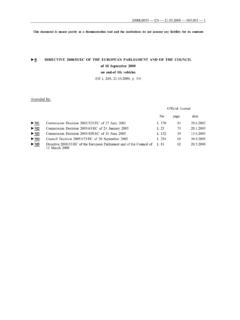Transcription of BASIC PRINCIPLES AND OBJECTIVES OF PUBLIC …
1 1 BASIC PRINCIPLES AND OBJECTIVES OF PUBLIC procurments BASIC PRINCIPLES OF PUBLIC PROCUREMENTS Due to diversity of living situations, legislation cannot establish norms for each legal situation; hence knowledge of PUBLIC procurement BASIC PRINCIPLES is very important. It is necessary to understand legal regulations through certain PRINCIPLES guiding the contracting authority in its decision-making, and the tenderer in the assessment of its rights in PUBLIC procurement procedures. In the area of PUBLIC procurement as well, it is considered that, in addition to PUBLIC procurement specific PRINCIPLES , PRINCIPLES having become common value criteria of our civilization and covering the whole legal system are to be taken into consideration Mu ina and Vesel 2004: 102-103). PUBLIC procurement system setup, development and implementation must be based on the principle of free movement of goods, the principle of freedom of establishment, and the principle of freedom to provide services, all deriving from the Treaty establishing the European Community (Official Gazette of the Republic of Slovenia No 7/04, hereinafter referred to as: EC Treaty) and on the PRINCIPLES of economy, efficiency and effectiveness, of ensuring competition among tenderers, of PUBLIC procurement transparency, of equal treatment of tenderers, and of proportionality.
2 The BASIC PRINCIPLES are specified in Article 2 of Directive 2004/18/EC, as follows: - principle of equal treatment, - non-discrimination and - transparency. Treaty establishing the European Economic Community (hereinafter referred to as: EEC Treaty) provides the BASIC framework for PUBLIC procurement legal regulation. This act was primarily aimed at establishing a relevant common internal market of Member States at prohibiting any national discrimination and any restriction in the selection of products and services including the free movement of goods exclusive of all customs duties, as well as at prohibiting quantitative limits (quotas) and measures having equivalent effect over customs duties and quotas among Member States. The objective of the EEC Treaty would be best attained also by prohibiting restriction placed to the free movement of labour force and services, capital, salaries and self-employment, as well as by the freedom of choice of establishment of enterprises in Member 2 States.
3 The attainment of the Treaty objective is to include the development of European Community significant policies, notably in the areas of competition law, state aid and agriculture (Trybus 2006:7). The EEC Treaty does not specifically mention PUBLIC procurements, except in the context of funding Community contracts in overseas countries and when in relation to industrial policy, though provisions might be found in the EEC Treaty constituting a basis for PUBLIC procurement system establishing. These are principally provisions referring to the free movement of goods (Article 28), the freedom of establishment (Article 43), and the freedom to provide services (Article 49) (Arrowsmith 2005: 182).{XE Arrowsmith } Other provisions are equally important relating to the prohibition of discrimination (Article 12) and to the issue of acquired undertaking (Articles 81, 86, and 87).1 {XE Treaty establishing the European Community }The regime of free movement of goods and services is the most important for the area of PUBLIC procurement.
4 Treaty establishing the European Community (hereinafter referred to as: EC Treaty) contains the BASIC objective of the PUBLIC procurement acquis, meaning the opening of the PUBLIC procurement market among Member States and allowing tenderers to participate in PUBLIC contact awarding procedures beyond the frontiers of individual Member States. Since it would not be possible for Member States, on the basis of the EC Treaty, to establish more specific PUBLIC procurement rules, PUBLIC procurement directives have been adopted as a secondary legal States which, pending the adoption of directives, had not adopted any PUBLIC procurement laws ((for instance, the United Kingdom), almost literally transposed these directives to their 1 The order of Articles and decisions (EC Treaty) was renumbered as a result of the amendments to the 1957 Treaty of Rome as well as 1992 Maastricht Treaty and 1997 Amsterdam Treaty and 2001 Treaty of Nice.)
5 Member States not having maintained long traditions of PUBLIC procurement legislation, such as France with Code de Marches publics and Germany with Verdingungsordnungen , had to amend their legislation systems and harmonise it with the directives, which on the other hand gave rise to significant difficulties and problems since these countries had not properly implemented the content of the directives when they should have done so (Trybus 2006: 7). {XE 2 92/50/EEC relating to the coordination of procedures for the award of PUBLIC service contracts, 93/36/EEC coordinating procedures for the award of PUBLIC supply contracts, 93/37/EEC concerning the coordination of procedures for the award of PUBLIC works contracts, 93/38/EEC coordinating the procurement procedures of entities operating in the water, energy, transport and telecommunications sectors, 97/52/EC amending Directives 92/50/EEC, 93/36/EEC and 93/37/EEC, 98/4/EC amending Directive 93/38/EEC, 2001/79/EC amending Directives 92/50 EEC, 93/36 EEC, 93/37 EEC, 93/38/EEC, 97/52/EC and 98/4/EC.}
6 According to Article 189(3) of the EEC Treaty, directives oblige the Member State in terms of the objective to be achieved; national authorities are free to choose the form and means. As regards the freedom to choose the form, it should be mentioned that this freedom is rather restricted, on the basis of experiences with pre-access and access to full membership. 3 This also refers to Slovenia when adopting the PUBLIC Procurement Act (PPA-1). 3 Trybus }Understanding BASIC PRINCIPLES and establishing thereof to a legislation system is even more significant in view of the fact that, though the implementation of the directives was not effective everywhere, the PRINCIPLES as such create a single core for interpreting and attaining OBJECTIVES accompanying the PUBLIC procurement system through founding contracts and relevant directives. The PRINCIPLES have an important role to play, both in directing the legislator when adopting the content of legal norms and in the understanding of legal provisions, particularly in cases of imprecise determination thereof.
7 Primarily proper understanding and interpretation of certain PRINCIPLES facilitates the interpretation of legal norms in terms of content, context, and purpose. Legal PRINCIPLES connect legal norms to a single whole providing such norms with the required content, particularly in cases where the flamboyance and diversity of accrual circumstances cannot always be covered by a legal norm. A legal rule needs to be understood by means of a specific principle constituting both the direction and the purpose of drafting a particular legal norm (Mu ina and Vesel 2004: 102). 1. 1. 1. The principle of economy and efficiency in the use of PUBLIC assets The principle of economy, efficiency and effectiveness is effectuated in such a manner that the contracting authority must carry out PUBLIC procurement so as to guarantee economic and efficient use of PUBLIC assets and successfully attain the goals of its existence determined in line with regulations covering the usage of budget assets and of other PUBLIC assets.
8 If the subject of PUBLIC procurement so allows and if that contributes to a higher level of economy and efficiency in the carrying out of a PUBLIC procurement procedure, the contracting authority must compile the tender documentation in such a way so as to make possible offer submission following closure. In doing so, the contracting authority must provide for non-discriminatory treatment and thereby higher accessibility of PUBLIC procurement to economic operators. This principle obliges the contacting authority that, by carrying out PUBLIC procurement and by tenderer selection, it must guarantee that it has made best economic use of funding allocated to it in terms of the ratio between the investment outlay and the benefit gained. One of the goals of the overall system of PUBLIC procurements is also the rational usage of PUBLIC finance; each contracting authority must be aware of responsibility when dealing with PUBLIC assets it uses in a PUBLIC procurement procedure.
9 The principle of efficiency requires the usage of funds allocated in such a manner that maximum goals be attained; the principle of economy, on the other hand, means the achieving of a desired effect with minimum volume of assets involved. Act on the Court of Auditors (Official Gazette of the RS No. 11/01) sets out that audits of operational appropriateness include checks in terms of economy, efficiency and effectiveness. 4 The following text includes definitions of notions taken over from European Union Decree and relating to its general budget. 4 - Economy: The principle of economy requires that resources used by an organization for the performing of its activities are available at the right time, under appropriate quantities and quality, and at best prices. - Efficiency: The principle of efficiency is measured by the best proportion between used investment outlays and effects achieved. - Effectiveness: The principle of effectiveness is measured by the attainment of specific determined goals and foreseen results.
10 Effectiveness is also determined as a ratio between investments and results or goals not determined financially (by income or by other profit with assets) in the PUBLIC sector; this is why measurable goals need to be determined, specified by the mission of the institution disposing with PUBLIC assets furthermore, the attainment thereof needs to be monitored though there is so much variety when it comes to goals in the PUBLIC administration that it is hard to specify a single synthetic indicator to be fully demonstrating effectiveness (Andolj ek and Seljak: 2005: 164). The contracting authority is hence required to balance the economic, the efficient and the effective (we shall further jointly name all these three "economy or economy-related ); economy expectations tend to be rather diverse and sometimes subjective. In the PUBLIC procurement system, a relatively objective indicator of economy could be savings attained for better competitiveness, proportionality and appropriateness of conditions, criteria etc.












